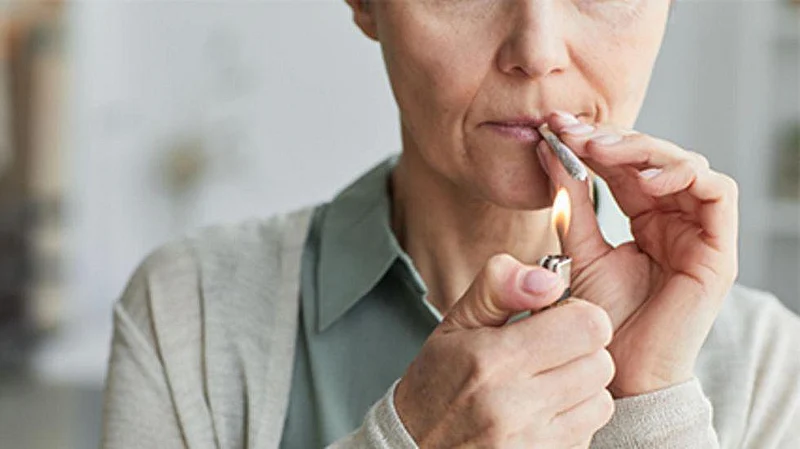Get Healthy!

- Denise Mann
- Posted October 13, 2021
Nearly Half of U.S. Breast Cancer Patients Use Pot or CBD; Many Don't Tell Doctors
When Brooklyn-based mom and fashion designer Suzanne Weiner began treatment for breast cancer three years ago, her medical marijuana card was her best friend.
"Pot helped me tremendously with the anxiety and stress of my diagnosis," she said. "I was a mess." Weiner still smokes marijuana regularly to help lessen the side effects of an ongoing treatment that helps keep her cancer at bay.
She's not alone. Almost half of all people with breast cancer use marijuana or CBD, often during treatment to ease side effects including pain, anxiety, insomnia and nausea, according to a new online survey.
While Weiner discussed her cannabis use with her doctors, who she said were both knowledgeable and supportive, this isn't always the case. Many patients don't talk to their doctors about it, the survey revealed.
This is risky, according to survey author Dr. Marisa Weiss, founder and chief medical officer of Breastcancer.org and Breasthealth.org in Ardmore, Pa.
"Some chemotherapy drugs are broken down by the same part of the liver that cannabis is, and you don't want to overtax the liver," she said. And, "smoking or vaping when receiving radiation or other therapies to your chest could affect lung function."
Cannabis isn't necessarily bad for you, and it may very well have some benefits, Weiss said.
Like Weiner, 75% of survey respondents who used cannabis said it was extremely or very helpful in relieving their symptoms. "These symptoms are wearing them down thin and interfering with quality of life and ability to finish treatment," Weiss said.
Of 610 adults who were diagnosed with breast cancer within the past five years, 42% said they used cannabis for symptom relief. Of these, 79% used cannabis products during breast cancer treatment, the survey showed.
Patients used both THC and CBD products, with a majority preferring CBD (cannabidiol). CBD is derived from hemp, a cousin of the marijuana plant, but unlike THC (delta-9-tetrahydrocannabinol), the active component in marijuana, CBD won't get you high. On average, survey respondents used more than three types of cannabis products including gummies, inhalables or extracts.
The survey also revealed some disconnects about cannabis.
Nearly half of users thought cannabis could treat cancer -- but it can't. Many assumed it was 100% safe -- and it's not, Weiss said. A possible reason for these disconnects? Most people got their information on cannabis from family, friends and the internet, not their doctor, the survey revealed.
Weiss said it should be "do ask, do tell" when it comes to cannabis use during cancer treatment.
"It is important to let your doctor know that you have these symptoms and that you want to learn more about cannabis and also ask if there are other therapies for these symptoms," she said.
People are reluctant to talk to their doctor about cannabis use for several reasons.
"Marijuana is still illegal at the federal level so that may inhibit people from talking to their doctor, and some may be fearful that it could be placed on their medical records," Weiss said. "Others don't want to be judged and don't think their doctor is likely to know much about it anyway."
If your doctor isn't willing to at least have the discussion, consider finding one who is knowledgeable about cannabis or is open to learning more, she suggested.
Such knowledge is critical now that cancer is a qualifying condition in nearly all states with medical cannabis programs, Weiss pointed out.
The findings were published Oct. 12 in the journal Cancer.
While cannabis may help with some symptoms of cancer and/or its treatments, outside experts noted that risks and unknowns remain.
Dr. Stephanie Bernik, chief of breast surgery at Mount Sinai West in New York City, noted there is limited data regarding cannabis use and interactions with chemotherapy.
"Patients should discuss cannabis use with their doctors so that there can be a clear understanding of possible adverse events," she said. THC risks may include dizziness, racing heartbeats and paranoia, while CBD may cause drowsiness and reduced appetite.
"More studies need to be done to find ideal ways to allow patients to use cannabis in a more controlled fashion," Bernik said.
Just because something is natural and plant-based doesn't mean it's 100% safe, agreed Dr. Nirupa Raghunathan, who runs the medical cannabis clinic at Memorial Sloan Kettering Cancer Center in New York City.
"Cannabis is not necessarily benign, and there can be negative side effects and risks of interactions with your treatment," she said.
It's also buyer beware when purchasing cannabis products, Raghunathan said. Many CBD products, in particular, don't contain what is listed on their label.
Your best bet is to buy products through a state-run marijuana dispensary, Raghunathan said.
More information
Breastcancer.org offers more about medical cannabis and cancer.
SOURCES: Suzanne Weiner, cancer patient, Brooklyn, N.Y.; Marisa Weiss, MD, founder and chief medical officer, Breastcancer.org and Breasthealth.org, Ardmore, Pa.; Nirupa Raghunathan, MD, director, pediatric integrative medicine, Memorial Sloan Kettering Cancer Center, New York City; Stephanie Bernik, MD, chief, breast surgery, Mount Sinai West, New York City; Cancer, Oct. 12, 2021
